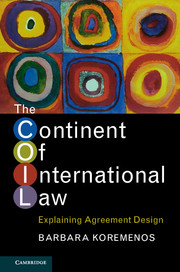Book contents
- Frontmatter
- Dedication
- Contents
- List of figures
- List of tables
- Acknowledgments
- 1 (Re)discovering the continent
- Part I COIL's building blocks: theory and data
- Part II Flexibility provisions in the design of international law
- Part III Centralization, scope, and control provisions in the design of international law
- Appendix 1 List of agreements in COIL sample
- Appendix 2 Coding rules
- Appendix 3 Selection issues in international cooperation data sets
- References
- Index
Part III - Centralization, scope, and control provisions in the design of international law
Published online by Cambridge University Press: 05 June 2016
- Frontmatter
- Dedication
- Contents
- List of figures
- List of tables
- Acknowledgments
- 1 (Re)discovering the continent
- Part I COIL's building blocks: theory and data
- Part II Flexibility provisions in the design of international law
- Part III Centralization, scope, and control provisions in the design of international law
- Appendix 1 List of agreements in COIL sample
- Appendix 2 Coding rules
- Appendix 3 Selection issues in international cooperation data sets
- References
- Index
Summary
Introduction to Part III
The literature on international institutions historically has focused on information as the main problem of cooperation and information provision, usually through centralization, as the main solution. This historical emphasis on information provisions to help stabilize cooperation originated for a reason. Provisions calling for functions like monitoring are tremendously important if states are going to solve their joint problems through international law because information provisions reduce uncertainty, thereby reinforcing strategies of reciprocity that can be so critical to cooperation (Keohane 1984; Axelrod and Keohane 1985: 250). Furthermore, the conventional wisdom suggests that, when such functions are centralized through international regimes, cooperation is more robust (Axelrod and Keohane 1985: 250). As Chapter 3 showcased, while the formidable Enforcement problems and Uncertainty about Behavior do not overwhelm the landscape of cooperation problems, they do underlie a non-trivial number of cooperative endeavors. As a result, provisions encouraging compliance in such environments are important to cooperation.
Part III of this book brings the focus to such provisions. It refines substantially earlier institutionalist arguments both theoretically and empirically. In particular, it reemphasizes a claim made earlier, as well as in Rational Design, regarding the absolute necessity of separating Enforcement problems from uncertainty problems and of differentiating among various kinds of uncertainties, something that the earlier emphasis on 2×2 games tended to obscure.
Part III also differentiates the set of design provisions that have been traditionally labeled under the umbrella of “compliance provisions.” So-called “compliance provisions” are the cornerstone of much IR scholarship, but they are often employed in the literature without carefully phrased definitional boundaries. Moreover, scholarship often equates such terms with “deep institutionalization,” which itself is taken for granted as increasing the prospects for cooperation. In what follows, I separate the dispute resolution, punishment, and monitoring design dimensions and allow for the possibility that they may be performed in a decentralized and/or centralized manner. If delegation occurs, I further ask if it is external or internal. Finally, if it is internal, I consider the voting rules characterizing the delegated body.
Chapter 7 zeroes in on dispute resolution provisions and explains, first, when states are likely to incorporate such provisions into their agreements and, second, what kind of dispute resolution provision they will choose.
- Type
- Chapter
- Information
- The Continent of International LawExplaining Agreement Design, pp. 193 - 198Publisher: Cambridge University PressPrint publication year: 2016



